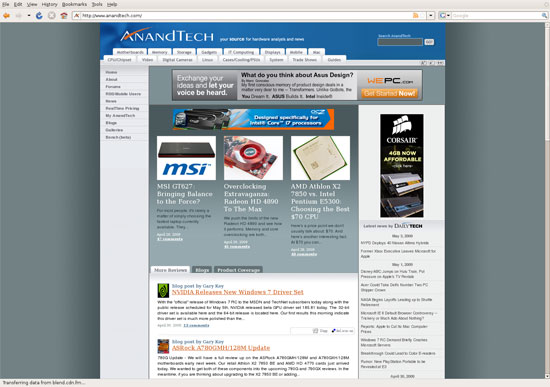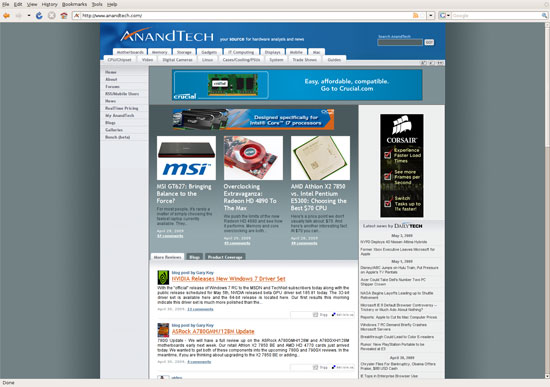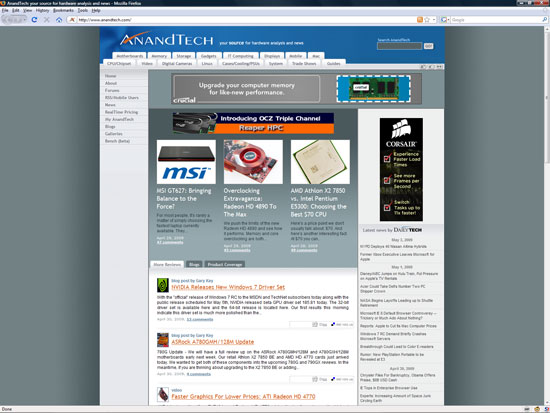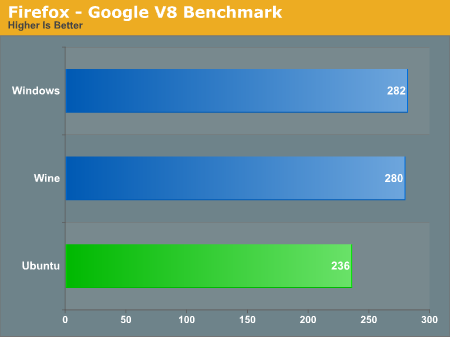Revisiting Linux Part 1: A Look at Ubuntu 8.04
by Ryan Smith on August 26, 2009 12:00 AM EST- Posted in
- Linux
Applications: Web Browsing
Windows Default: Internet Explorer 7
What I use: Firefox 3
Ubuntu Default: Firefox 3
Much to the chagrin of Microsoft, the web browser is turning in to a miniature OS of its own, and in the case of anything that’s not Internet Explorer, it’s a miniature OS that has no allegiance to a real operating system. It’s the primary way to retrieve most information from the internet, applications can be created through AJAX and Flash, video can be watched (see: Hulu). A good cross-platform web browser removes a great deal of the need to use any specific OS, and this is something that works in Ubuntu’s favor.
Ubuntu ships with Firefox 3, Internet Explorer’s loyal opposition and currently the #2 browser on the market. So long as a site isn’t built for IE6 Firefox has great compatibility, good speed, and an army of extensions to add features to it. Since many of you already use it, there’s not a lot to say here: it’s a very solid browser, and something I find to be superior to Internet Explorer.

As I already use Firefox under Windows, the transition here was virtually non-existent. Ubuntu doesn’t have any direct Windows to Ubuntu transition tools, but after moving my Firefox profile from Windows to Ubuntu and reconfiguring a few location-sensitive settings, I was up and going. Internet Explorer users are going to have more of a transition obviously, but it’s not much. All of the major browsers’ core behaviors are the same, which makes it easy to switch among them with little fuss.
At the risk of marginalizing the rest of Ubuntu, I consider Firefox to be one of the core components that makes Ubuntu a success story. Because so much computer use these days is inside a browser, it has become a lynchpin for a good OS. If your browser is bad, then it’s probably hurting the usability of your OS if it means that many users cannot do something they regularly do on another browser. One only needs to look at the early versions of Mac OS X to get a good picture of this, as it shipped with the only-bearable Internet Explorer 5.
There are however a few caveats that I’d like to hit on. Something that continues to throw me for a loop is that while it’s the same Firefox I use under Windows and Mac OS X, it doesn’t necessarily look the same. The rendering engine is the same, but OS differences start to play out here. Mac OS X, Windows, and Ubuntu all render text slightly differently, and in the case of Ubuntu come with a significantly different font set. Because Firefox is at the mercy of the OS for fonts, what you get are small but noticeable differences in how the same page looks.

Firefox with default fonts

Firefox with MS Core fonts

Firefox under Windows
Above we have AnandTech rendered in Firefox 3 on Windows, and Ubuntu. On Windows Firefox uses Times New Roman and Arial for its default fonts, but these fonts do not exist on Ubuntu; rather Ubuntu uses what’s called “serif” and “sans-serif”. This along with how the two OSs differ in font anti-aliasing results in the different look of Firefox under Ubuntu. Having used Windows for a number of years, I have never gotten past the idea of Ubuntu looking “wrong” even though the right look is entirely subjective.
Ultimately I ended up adding the missing fonts by installing the msttcorefonts package, which contains Times New Roman, Arial, and the other “big name” standard fonts. With those installed and Firefox configured to use them, text looks much closer, although not quite the same. It’s a shame that Ubuntu can’t include these fonts by default.
The second caveat is one of performance. When using Javascript-heavy sites in particular, Firefox on Ubuntu seems just a bit slower than under Windows. I had never been able to figure out why until I saw this Slashdot article. Firefox for Linux is not compiled with profile guided optimization, a method of improving the performance of binaries by looking at how they’re used. While Ubuntu compiles their own releases of Firefox, they do the same thing. As a result, there’s a speed difference in Firefox – it’s the same code, but the Windows version is compiled in such a way that it’s faster. As I wrote at the start of this article, I’m not concerned with the performance of Ubuntu or its applications for the most part, and this falls under that notion. Firefox is slower, but not to the point that I care. It’s interesting enough that it bears mentioning, however.
Just to give you an idea of what the speed difference is, here’s a breakout of one of our Firefox benchmarks from the benchmarking section later in this article:

As you can see, in this Javascript-heavy test Firefox on Ubuntu is upwards of 17% slower than it is under Windows. As this performance gap manifests itself largely under Javascript-heavy situations; regular browsing doesn’t show nearly the difference. Flash is also slower, but this has nothing to do with Firefox and more to do with Flash’s mediocre performance under any OS that isn’t Windows.
The last caveat is one of how Ubuntu’s distribution model becomes strained when it comes to Firefox. Ubuntu Hardy shipped nearly 2 months before Firefox 3 did. But because Ubuntu is meant to be a stable platform they still needed to package Firefox 3 with the OS, so Firefox 3 Beta 5 was included. If we had done this article a month after Hardy launched as intended, I’d have few nice things to say. Firefox 3 Beta 5 combined with Adobe Flash 9 was buggy, unstable junk. Canonical made the right decision as the final version of Firefox 3 turned out well, but it highlights the pitfalls of including 3rd party software with the OS.
The flip side of this caveat is that Firefox 3.5.x has superseded 3.0.x as the newest Firefox branch, which means that only 3.0.x versions are being pushed out to Hardy. This means if you want to take advantage of any of Firefox’s newest features such as the new javascript engine, you’ll need to install a 3.5.x build separately, ideally through a PPA package so that it cleanly replaces the default version of Firefox.
But even with those caveats, none of them are serious issues. Firefox 3 is still a fantastic browser and there’s nothing else I’d rather have on Ubuntu.
Final Verdict: Meets My Needs










195 Comments
View All Comments
cosplay - Thursday, July 8, 2010 - link
Your ignorance and stupidity is showing here. No engineering software for Linux? Hello? Matlab is available, Simulink is available, Labview the same. Xilinx and Altera have supported Linux for a long time and so do the smaller FPGA houses like Lattice and Actel. Mentor Graphics too. Orcad is the only one you mentioned that isn't available on Linux, but Cadence does support Linux with their Allegro product and so does Mentor Graphics with PADS and Board Station and Expedition.amiracollections - Monday, August 30, 2010 - link
i find a fashion shop, they supply handbags, wedding dresses, party dresses, evening dresses. and the price lower to others, more info to http://www.amiracollections.co.uknar321 - Thursday, September 23, 2010 - link
Love it, more important it installs on drives that BSOD if trying to install WinXP.kevith - Monday, December 6, 2010 - link
to see the Danish - as in inhabitants of my country, Denmark, and not like in pastry - gratis = free here at Anands:-)alunduo - Thursday, January 27, 2011 - link
i have a wonderful website: http://www.wonderful-again.comalunduo - Thursday, January 27, 2011 - link
wonderful website: <a href="http://www.wonderful-again.com">www.wonder...amorexue - Sunday, September 18, 2011 - link
http://www.loveweddingdress.co.uksummershine - Wednesday, November 2, 2011 - link
Good article! I also wish you can come to my site! It is a new site selling wedding dresses online: http://www.brideswardrobe.com.au/xuli - Thursday, November 3, 2011 - link
This a new website!There are many wedding dresses here:http://www.brideswardrobe.com.au/.ultraseksy - Thursday, March 8, 2012 - link
best blog ever I have read all 17 pages of comments…a lot of Linux lovers out there… and they all purposely ignore few important things that make Windows successful, which in term, makes most Linux distribution marking failures, I have used Linux on my net book and my ps3, and I absolutely.http://www.ultraseksy.com
http://www.ultraseksy.com/blog